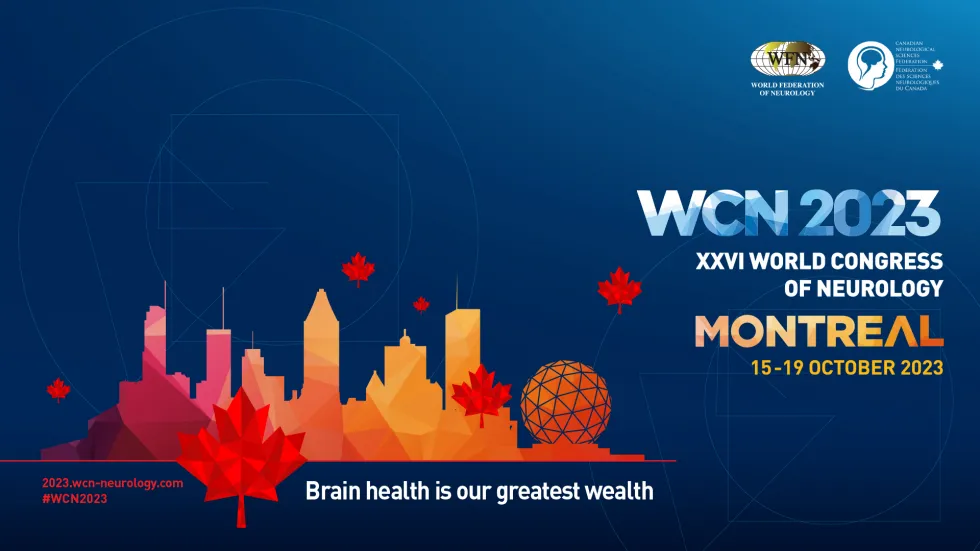
MONTREAL, Oct. 19, 2023 – Africa currently experiences some of the most extreme shortages of neurologists and health care funding and some of the highest rates of disability due to neurological disorders in the world. Dr. Augustina Charway-Felli, president of the African Academy of Neurology, recently proposed a plan for addressing these disparities by emphasizing regional training to increase the number of neurologists throughout Africa and prioritizing education for primary care providers and non-specialists.
“The last three years have been extremely detrimental to the state of neurology in Africa,” said Dr. Charway-Felli, speaking at the 26th World Congress of Neurology. “As a result of both the global pandemic and the geopolitical situation, there has been a significant brain drain that has adversely affected the ratio of healthcare providers to population throughout Africa. There are multiple reasons for this, but economic investment is one of the biggest ones.”
African countries have some of the lowest levels of national health care spending worldwide, and the percentage of GDP that goes to health spending is not increasing at the same rate as in middle and high-income countries. More than 50% of the population is under the age of 25, with a higher portion of the youth population residing in urban areas. Yet 36% of the continent’s urban regions are in poverty, further amplifying disparities in care, staffing, and resources.
Shortage of Neurologists Increases Disparities in Global Neurological Care
Of the African countries with the highest ratio of neurologists to population, only one, Tunisia, meets the World Health Organization’s minimum recommendation of one neurologist per 100,000 thousand people. By comparison, high-income countries have an average of 7.1 neurologists per 100,000 people. Additionally:
- The 10 African countries with the fewest neurologists have only .01 to .03 neurologists per 100,000 people.
- There are more than five African countries that have no neurologists at all.
- There is an average of .12 neurologists per 100,000 people, across all African countries combined.
- There are 27 countries with no child neurologists—half of the total countries in the continent.
- Africa has only .01 child neurologists per 100,000 people on average.
“We have a very young population, meaning that the requirement for child neurologists is great, but there is an extreme shortage of child neurologists,” said Dr. Charway-Felli. “For a population of 1.37 billion and growing, there are only 324 child neurologists across Africa. This is ten times less than the number of adult neurologists, which is already inadequate.”
A Unified Approach to Regional Neurologist Training and Education
Dr. Charway-Felli presented a plan for expanding and strengthening the neurological health care system across Africa, which is driven by four key aims:
- Training the existing health care workforce and identifying current shortfalls
- Reducing the “brain drain” on overworked and under resourced health care staff
- Increasing the specialized neurological workforce
- Public education, engagement and advocacy
“To improve access to neurological care for our population, we need to increase training and increase the number of neurologists,” said Dr. Charway-Felli, “but we also need to involve every single link in the chain of brain health, from the individual all the way to organizations, governments and policy makers. We're able to do this through inter-regional collaboration.”
Dr. Charway-Felli emphasized that neurologists who leave the country for training are less likely to come back to work in their home countries than neurologists trained in Africa. One of the main goals of inter-regional collaboration is to establish training programs that will keep new neurologists working in their home countries where the need for care is greatest. This is one mission of the World Federation of Neurology-accredited training centers currently operating in Dakar, Senegal; Rabat, Morocco; Cairo, Egypt; and Cape Town, South Africa.
Additionally, Dr. Charway-Felli called for expanding dedicated disease training for primary healthcare providers, non-neurologists and healthcare personnel on conditions that disproportionately impact low and middle-income countries where specialized neurology care is unavailable. Some of these conditions include headache, stroke, dementia, epilepsy, and inflammatory and autoimmune disorders.
“The most important person in the path of the individual seeking neurological care is the primary healthcare provider. We need to train them to recognize neurological disorders early—not when it is too late, when we are unable to have any significant impact on an individual's life. Early recognition is key, and primary healthcare providers are best placed for early recognition. So we cannot move forward without moving with them.”
Visit wcn-neurology.com to learn more about Dr. Charway-Felli and all the featured research at this year’s WCN.
About the World Congress of Neurology
The World Federation of Neurology’s World Congress of Neurology brings together leading neuroscientists and public health experts to turn research into action and emphasize the importance of brain health across the globe. The 26th biennial conference was held in Montreal from October 15 to 19, 2023, and was co-hosted by the Canadian Neurological Society (CNS).
About the World Federation of Neurology
With support from its 124 national Member Societies, the World Federation of Neurology fosters quality neurology and brain health worldwide by promoting neurological education and training, emphasizing under-resourced areas of the world. As a non-state actor in official relations, WFN supports the World Health Organization (WHO) efforts to give everyone an equal chance to live a healthy life. With Member Societies around the globe, WFN unites the world’s neurologists to ensure quality neurology and advocate for people to have better brain health. Learn more about the World Federation of Neurology at wfneurology.org.
Media Contact
Ryan Pollock, Yakkety Yak
ryan@yakketyyak.com







